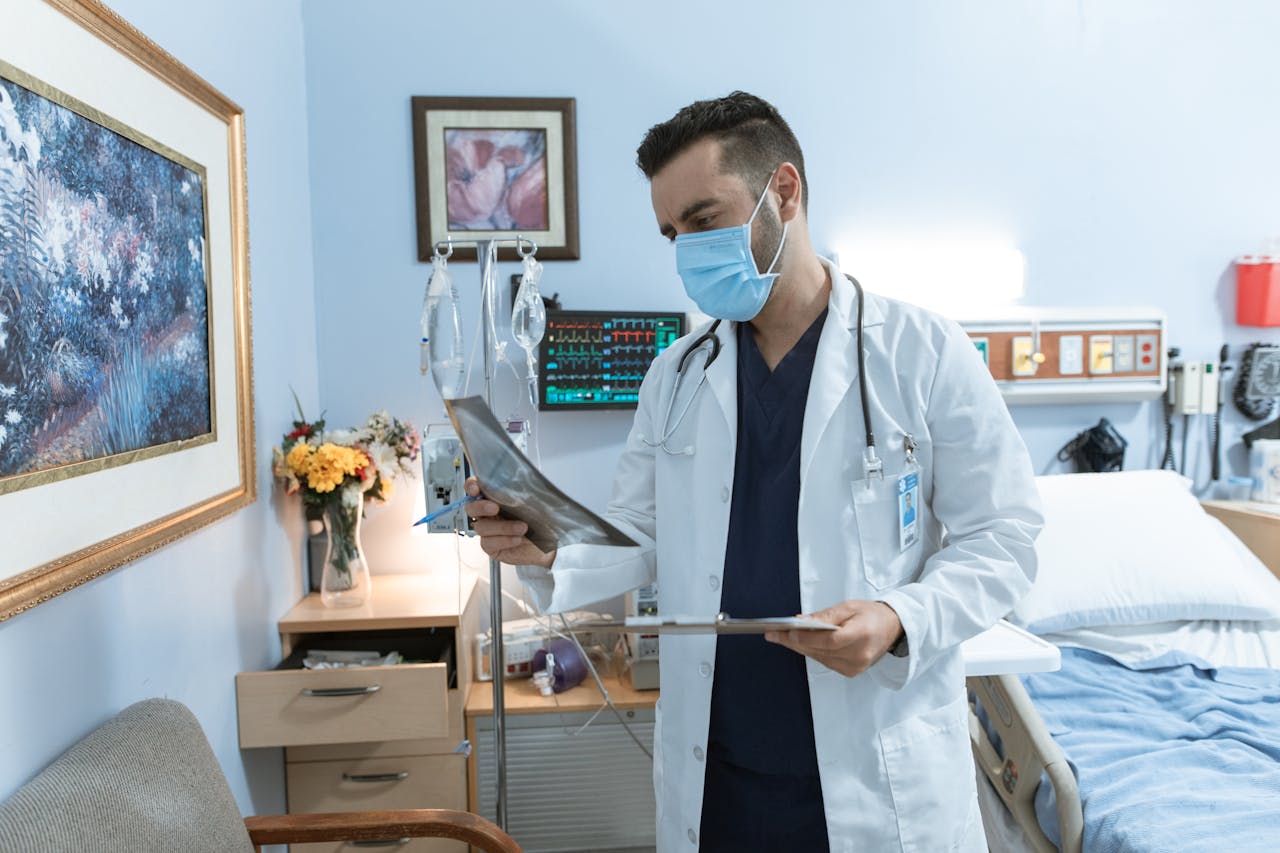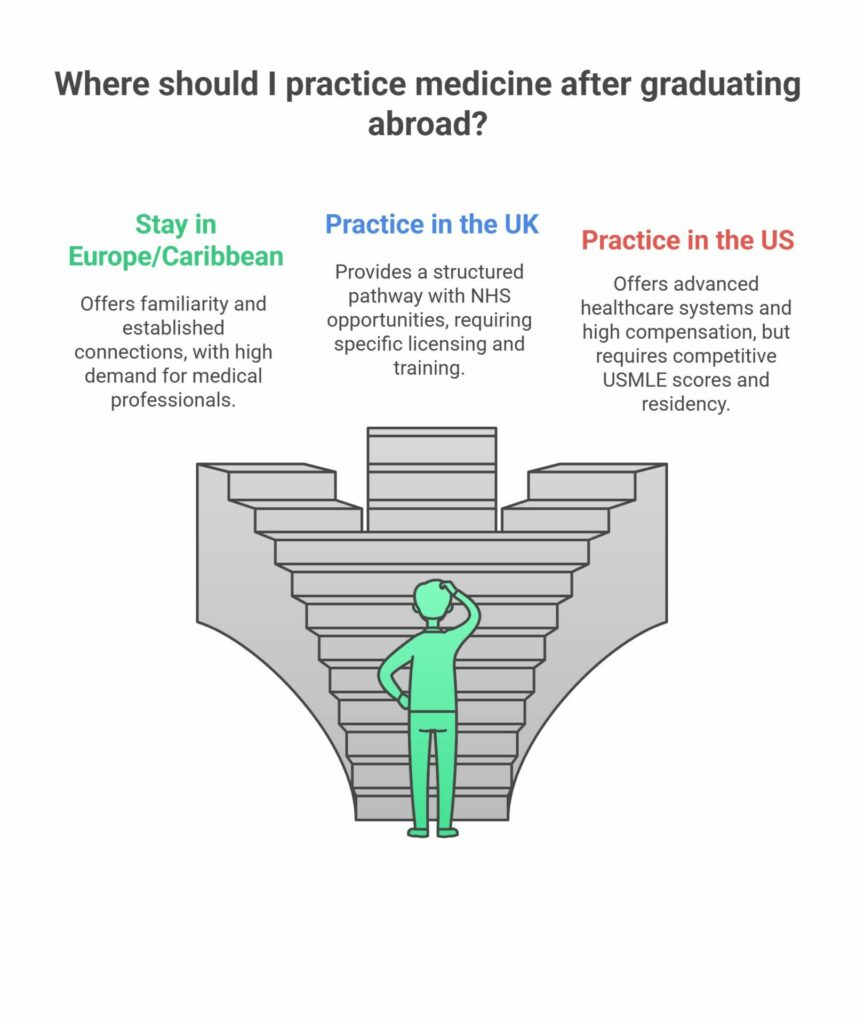What Happens After I Graduate? Career Paths After Studying Medicine Abroad


An increasing number of students from Western countries like Germany, France, the UK, and the US are choosing to study medicine abroad. But once you’ve earned your medical degree, what’s next? The path forward can vary greatly depending on whether you want to stay where you studied, go back home or endeavour toward a completely different destination.
In this blog, we’ll explore the most popular options after graduating from medicine abroad - staying where you’ve studied, going to the UK to practise, or moving to the US to become a doctor.
We know how busy both students and parents are, and we want to respect your time. Here are the key takeaways of this blog to help you decide if this is the right read for you:
- Studying medicine abroad at an accredited medical school opens doors to becoming a doctor in the UK, the US, Europe, the Caribbean, and more.
- After graduating, you will typically need to pass a licensing exam, register with the local medical body, and go through residency training.
- International medical graduates have the same opportunities for career growth and progression as native graduates. The important factors are your knowledge, skills, and dedication.
- If you plan to become a doctor in a country different from where you graduated, gaining clinical experience there through electives or rotations can significantly boost your chances of matching into a residency.
- Securing the correct visa is crucial for practising medicine. Depending on where you plan to work, you’ll need to apply for specific visas.
Table of Contents
- 1 Option 1. Staying in Europe or the Caribbean
- 2 Option 2. Becoming a Doctor in the UK
- 3 Option 3. Becoming a Doctor in the US
- 4 Why This Matters to You
- 5 FAQ
- 5.1 What is the difference between the UK’s PLAB and UKMLA exams?
- 5.2 Do I need to complete Foundation Year training in the UK as an IMG?
- 5.3 Can I apply for residency in the US without US clinical experience?
- 5.4 How long does it take to become a doctor in the US after medical school?
- 5.5 What visa do I need to work in the US as an IMG?
- 5.6 How long does it take to complete medical training in Europe or the Caribbean?
- 5.7 What are the best medical schools in Europe for English-speaking students?
- 5.8 How competitive is the residency match in the US for IMGs?
- 5.9 What are the best options for studying medicine in the Caribbean for international students?
Option 1. Staying in Europe or the Caribbean
Studying medicine abroad, especially in Europe or the Caribbean, has become 1 of the top choices for Western students. But after spending 4-6 years in a beautiful new country, what happens if you’ve fallen in love with the place and want to stay?
Well, you’re in luck, because both regions have a high demand for medical professionals, and the countries here often have a clear pathway for international medical graduates (IMGs) to continue their medical careers locally. You’re even at a major advantage because you’ve already formed connections and have built up an understanding of the local healthcare system.
What happens immediately after graduation?
Regardless of where you’ve graduated, as long as you’ve studied at an accredited medical school, you will have gained sufficient clinical experience to join the workforce. To do so, depending on where you’ve graduated, typically you will need to complete 1 or more of the following steps:
- Complete a 1-year internship. However, in some countries, an internship is already part of the curriculum, and you only need to:
- Pass a state exam or equivalent to get your medical license.
- Register with the local medical body.
- Enter a residency for specialisation or start working as a general practitioner right after the state exam.
How does licensing work?
Licensing requirements vary slightly by country, but they generally include passing a licensing exam and getting certified by the local medical body. For example:
- In Germany, international graduates are required to pass a language proficiency test and a state exam before they can register to officially practice medicine.
- While in countries like Bulgaria, Hungary, and Georgia, all you need to do is pass your licensing exam and register with the local governing medical body, as long as you’ve passed your 1-year internship.
- In the Caribbean, you’ll need to apply to the relevant medical board in your country to receive certification to practice. While some countries may require additional exams, the process is generally quicker and less complicated than in other regions.
What about specialisation?
Then it’s back to studying and training. Depending on your speciality choice and country, specialisation training can take anywhere between 3 and 6 years.
If you’re curious what a typical pathway to specialisation looks like in Europe, the UK, and the US, feel free to read our blog: Step-by-Step Guide on How to Become a Dermatologist.
Career growth options
The demand for doctors remains high in both Europe and the Caribbean, with excellent opportunities for building a rewarding career in a variety of specialities.
For example, in Europe, there is an ongoing demand for doctors in fields such as geriatrics, family medicine, and internal medicine. The ageing population across Europe, particularly in countries like Germany, Italy, and Spain, has contributed to the increasing need for healthcare professionals in these areas.
In fact, countries like the UK and France have recognised this demand and continue to actively recruit doctors in these specialities to meet public health needs. The opportunity for career growth in Europe is strong, especially for those willing to work in underserved regions or specialities experiencing a shortage.
In the Caribbean, there is always a need for specialists in tropical diseases, public health, and infectious diseases. With the prevalence of specific conditions like dengue fever, Zika virus, and malaria, medical professionals with expertise in tropical medicine are in high demand.
There is also a steady need for specialists in general surgery, obstetrics and gynaecology, and paediatrics, especially in more rural areas. Career growth in the Caribbean can also involve involvement in international health organisations or focusing on developing a well-connected and modernised healthcare infrastructure.
Option 2. Becoming a Doctor in the UK
The UK is one of the European countries that has lagged behind the most in terms of doctors per capita. Currently, there is an active effort to address the problem by recruiting qualified IMGs to fill positions in the National Health Service (NHS). This means that current and future international graduates have a realistic and tangible shot at becoming doctors in the UK, provided they cover all criteria.
The process of moving from studying abroad to working in the NHS involves several essential steps, but there’s no need to worry, because it is all within a well-structured pathway designed for students just like you.
Getting licensed in the UK
First things first, you need to have a medical degree that fulfils all GMC criteria. You can check them out in our blog: GMC Approval Guide.
If you’ve studied medicine in Europe or the Caribbean, then you’re already on the right track. The UK has mutual recognition of medical degrees from many countries, especially in the European Union and the European Economic Area. If you’re curious which are the best medical schools if you want to become a doctor in the UK, then this blog is perfect for you: Top Medical Schools Abroad for UK Students According to Stats, Price & Quality.
Regardless, though, IMGs still need to go through the necessary steps to become licensed medical professionals in the UK. These are:
- Proving your English language proficiency.
- Passing the PLAB (Professional and Linguistic Assessments Board) or the UKMLA (UK Medical Licensing Assessment), which will replace the PLAB in the near future.
- Registering with the GMC.
- Going through Foundation Year training.
But what is the UK Foundation Year training?
Once you've graduated from medical school abroad and gotten your provisional license from the GMC, your 1st step in the UK is to complete the Foundation Years (FY1 and FY2). These years are designed to help you transition into clinical practice and further develop your medical skills.
Foundation Year 1 is essentially your introduction to medical practice in the UK. During FY1, you will rotate through different medical specialities, gaining hands-on experience under the supervision of senior doctors within the NHS. At the end of FY1, you'll need to pass the Foundation Competency Exam to continue to FY2.
In Foundation Year 2, you’ll take on more responsibility, including making decisions regarding patient care. FY2 is your opportunity to solidify your medical knowledge and prepare for applying it in speciality training programmes.
The Foundation Years are a mandatory part of the process for all international medical graduates who wish to practice in the UK. However, it’s important to note that not all IMGs will need to complete the full 2 years of Foundation training.
If you have previous postgraduate experience or have completed sufficient clinical training elsewhere, you may be eligible for a direct registration route, which can bypass some parts of the Foundation Years. The GMC assesses each case individually, so it’s essential to confirm whether you need to complete both years or if you qualify for an exemption.
To get an in-depth understanding of the topic, we’ve got you covered with 2 blogs: How to Become a Doctor in the UK if you’re an EU graduate, and if you’re a non-EU graduate.
What about speciality training in the UK?
After completing the Foundation Years, you will be eligible to apply for speciality training programmes, which will allow you to become a consultant.
The NHS handles the application process, but it is very competitive for specialities. You’ll need to submit an application, after which you may be invited for interviews. Research and networking are crucial during this stage, as strong references and experience in your chosen speciality will significantly improve your chances.
Certain specialities, like dermatology, cardiology, or neurosurgery, can be extremely competitive, so it’s important to build a strong portfolio during your Foundation Years. Doing electives, participating in research, and building a network can all play an important role in securing a place.
What visa do I need to practise medicine in the UK, and how do I get it?
First, you'll need a Tier 4 (General Student Visa) or a Tier 5 (Temporary Worker Visa) to enter the UK and complete your Foundation Year training (FY1 and FY2). These visas allow you to study or undergo training in the UK.
After completing your Foundation Year training, international medical graduates who wish to work in the UK must apply for a Tier 2 (Skilled Worker Visa). This visa is required once you have secured a job offer from a licensed sponsor, such as the NHS.
You can typically apply for the Tier 2 visa during or after the Foundation Year, once you’ve received your job offer and if you meet all health and legal requirements.
Along with your visa application, you’ll need to provide supporting documents such as:
- Job offer letter from an approved sponsor.
- Proof of English proficiency,
- Financial evidence to show you can support yourself during your stay in the UK.
All visa applications can be done online. Just ensure that you meet all the eligibility criteria, follow the application steps carefully, and you’ll be good to go.
Medlink Students also provides full support for visa registration to all students who have applied to medical school through us.
Will I have career growth opportunities in the UK as an IMG?
A question that sometimes comes up when we speak with students is: “Will studying medicine abroad put me at a disadvantage when it comes to career progression in the UK/US?”
And the answer is a resounding no. As long as you’ve got the knowledge and skills to back it up, you will always have a path toward career growth and progression.
The UK offers a treasure trove of opportunities, particularly within the NHS. The demand for doctors, especially in specialities like geriatrics, family medicine, and mental health, is only growing, giving plenty of options for young doctors to advance their careers.
Joining the NHS as a career choice offers long-term job security, opportunities for continued professional development, and a wide range of specialisation pathways. Additionally, the NHS is making consistent efforts to support the work-life balance of its doctors, making it an attractive option for many medical professionals.
Additionally, the experience you gain in the UK is internationally recognised, and having NHS experience can open doors to working in many other countries.


Option 3. Becoming a Doctor in the US
The United States is a top destination for international medical graduates thanks to the ultra-modern local healthcare system, high-level research opportunities, and attractive financial compensation.
Getting licensed in the US
The overall process for becoming licensed in the US is similar to that in the UK, but with a few differences. The typical steps are:
- Passing the USMLE exams
- Obtaining certification through the Educational Commission for Foreign Medical Graduates (ECFMG).
- Completing a residency
- Applying for state licensure
- Optional - applying for speciality board certification
In addition to relevant clinical experience, the US medical system values strong academic performance, competitive USMLE scores, and the ability to demonstrate a commitment to the field through research, volunteering, and networking.
How do I apply for a residency in the US?
One of the most crucial stages of becoming a doctor in the US is securing a residency position. After completing medical school and passing the necessary parts of the USMLE, IMGs can apply for residency programmes through the National Resident Matching Programme (NRMP).
The match process essentially asks applicants to submit their rank lists of preferred programmes, and hospitals submit their rankings of applicants. If both parties match, the candidate is offered a position.
However, securing a residency spot is very competitive. Strong USMLE scores are a must, but clinical experience, particularly US-based electives or rotations, also carries a lot of weight. Many residency programmes look for applicants with exposure to the US healthcare system, so completing electives at US hospitals or clinics is highly recommended.
Additionally, strong letters of recommendation from physicians who can attest to your clinical abilities are essential to your application.
If you want to learn which medical schools maximise your chances of becoming a doctor in the US, head on to our blog: The Top Medical Schools in Europe for Americans.
Specialisation and fellowships in the US
Specialisation and fellowship programmes in the US are among the best in the world, and completing 1 can open doors to a wide range of career opportunities in both clinical practice and academia worldwide.
Generally, after completing a general residency programme, you’re ready to pursue specialisation. But while the US is known for its extensive options for specialisation, it is also notorious for its incredible level of competition.
Fields such as dermatology, plastic surgery, and orthopaedics are particularly difficult to match into, and their speciality training programmes typically require a combination of very high USMLE scores, exceptional clinical experience, and research accomplishments.
Another option that many doctors opt for is to further their expertise through fellowships. Fellowships are additional training years dedicated to a specific subfield of medicine, with common areas being cardiology, gastroenterology, and oncology.
What visa do I need for the US?
There are 2 primary visa options for medical professionals:
The H-1B visa is a non-immigrant visa for foreign workers in speciality occupations. It is commonly used by IMGs who have been offered a residency or faculty position at a US hospital or institution. The H-1B visa allows doctors to work in the US for up to 6 years.
The J-1 visa is a cultural exchange visa that is commonly used for residency and fellowship programmes. While this visa is typically granted for a period of up to 7 years, it requires the holder to return to their home country for 2 years after completing their training before they can apply for a different visa status or permanent residency. It is worth noting that a waiver may be available for exceptional hardship or for working in a shortage area, which would allow you to stay in the US without returning home for 2 years.
What’s career development like in the US?
In the often-called land of opportunity, long-term career prospects for doctors are very attractive. The US offers excellent career advancement and some of the highest salaries for medical professionals, especially in specialities like surgery, radiology, and anaesthesiology.
Whether you’re working in a hospital or private practice, the US healthcare system provides many avenues for growth. Additionally, the chance to engage in cutting-edge research, clinical trials, and medical innovations is an exciting prospect for graduates who are passionate about advancing healthcare.
Just like the UK, training and clinical experience in the US are internationally recognised, meaning you can go for medical licensure elsewhere if the US lifestyle ends up not suiting you.


Why This Matters to You
Choosing your career path is 1 of the biggest decisions in a doctor’s life, and the wrong choice can have lasting consequences. Imagine putting in years of hard work, only to find out that the licensing process is more complicated than expected, or that the career opportunities you were hoping for aren’t as accessible as you thought. Without the right guidance, you could end up wasting valuable time, resources, and energy on a path that leads nowhere.
But don’t worry, this can easily be avoided. By making informed choices and understanding exactly what each country requires, you can ensure a smooth transition from medical school to a successful career. Whether you’re aiming for the UK, the US, Europe or the Caribbean, the right knowledge and preparation can make all the difference in your journey.
That’s what Medlink Students was created for. We provide expert guidance to students every step of the way to make sure they understand everything about the process of becoming a doctor. This includes everything from visa applications to understanding the specific licensing processes, residency opportunities, and much more. Our comprehensive support ensures that you’re making the right decisions, maximising your chances for success, and avoiding unnecessary risks.
Let us help you turn your medical degree into the career you’ve always dreamed of without the stress and uncertainty. Sign up for a free consultation with one of our academic advisors to get started on the right foot.
FAQ
What is the difference between the UK’s PLAB and UKMLA exams?
The PLAB (Professional and Linguistic Assessments Board) is currently used by international medical graduates to prove their medical and English proficiency. The UKMLA (UK Medical Licensing Assessment) aims to standardise the licensing process for all medical graduates wishing to practice in the UK, both from within the UK and internationally. The UKMLA is planned to replace the PLAB in the near future.
Do I need to complete Foundation Year training in the UK as an IMG?
It depends on your previous experience. If you have sufficient postgraduate or clinical experience, you may be eligible for direct registration with the GMC, without going through all parts of the Foundation Years.
Can I apply for residency in the US without US clinical experience?
While it is possible, US clinical experience, such as electives or rotations, is highly recommended and often necessary to be competitive in the residency match process.
How long does it take to become a doctor in the US after medical school?
After medical school, you’ll need to complete residency, which typically lasts between 3 and 7 years, depending on the speciality.
What visa do I need to work in the US as an IMG?
The H-1B visa is commonly used for IMGs who have a residency or faculty offer, while the J-1 visa is used for residency and fellowship programmes, with a requirement (which can be waived) to return to your home country for 2 years after training.
How long does it take to complete medical training in Europe or the Caribbean?
Medical degrees typically take between 4 and 6 years to complete, which includes or is followed by a year of internship before you can start working or enter residency.
What are the best medical schools in Europe for English-speaking students?
Popular options include medical schools in Bulgaria, Georgia, Poland, and Hungary, which offer degrees in English and are recognised by the EU.
How competitive is the residency match in the US for IMGs?
Residency in the US is highly competitive, with factors such as USMLE scores, clinical experience, and letters of recommendation being crucial to securing a spot.
What are the best options for studying medicine in the Caribbean for international students?
Popular Caribbean medical schools for international students include the University of Health Sciences School of Medicine in Antigua & Barbuda and Ross University in Barbados, offering degrees that are widely accepted in the US and UK.
Leave a Reply


About Medlink Students
Leading international recruitment company for medical students in Europe. British Council Certified Agents. 10+ years of experience and more than 10,000 students advised.








